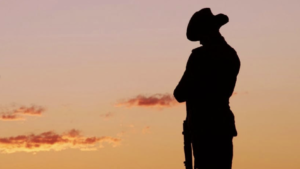Home » Commentary » Opinion » War and courage
· Ideas@TheCentre

 Among the victims of Covid-19 is our habit of annual pilgrimage to Anzac Cove in Turkey. And, tied to our houses, we are denied the annual fullness of local Anzac Day remembrance.
Among the victims of Covid-19 is our habit of annual pilgrimage to Anzac Cove in Turkey. And, tied to our houses, we are denied the annual fullness of local Anzac Day remembrance.
An invisible enemy has slain what is perhaps our nation’s most solemn annual event other than Easter. Both are recognitions in the same month of lives lost and celebrated in sacrifice to achieve great ends.
Traditions such as these are vital in holding nations together, and in celebrating them we do two things.
We shed our daily duties … our work and ’to do’ lists, and reflect, with our companions, upon the tradition and its meaning.
Current events have crippled the crowds that would normally aggregate in the cities and towns of the country. Nevertheless, we are free to communicate despite the absence of physical closeness and, above all, free to recall how our country endured defeat in a noble cause and with the utmost in duty and courage.
That reminder of the moral element in that great struggle is the essence of tradition. Death and defeat, by the courageous serving a good cause, is a model to be sustained by the essence of tradition; and it will continue to serve us in mustering our courage to deal with what we are presently confronting.
The young Australians who are denied the opportunity this year of flocking to Anzac Cove Remembrance Day in Turkey may have various reasons for seeking to do so — The energy and curiosity of youth is strong.
But whatever those reasons may be, it is plain that once there, they would be overtaken by an atmosphere of reverence and solemnity and — above all — by fellow-feelings of companionship and patriotism. In that atmosphere, the heart beats and the mind reflects in a surge of emotion.
Australians are often thought of as emotionally phlegmatic. This is false; on the whole they are simply modest, touchable and kind.
For the young, Anzac Cove has slowly created a place where their emotions can be lifted and the power of shared tradition absorbed.
Wherein lies that power?
The source is the realisation of shared emotion in imagining the extremities of warfare and their effects on those who fight and depend upon their companions for the sake of a common homeland.
Fear, pain and death claim terror and courage in the soldier, and his key resource is companionship and bravery. Only those who experience the horrors of war can tell its stories and its claims on the souls of companions. We may not see and feel what happens to the soldier — but we can imagine it and our hearts can respond accordingly.
This imagining, I suspect, is the motive sought by the young and the normal response is understanding and attachment to the ‘Anzac Tradition’.
But the story does not end there. A stable and happy nation needs its traditions shared widely, lest they be lost. Every loss chips away at our unity and cohesion. But the tradition must be seen as good and trustworthy.
The Australians of 1914 were predominantly of British descent, political structure and culture. To a significant degree they were dependent upon British protection.
It was not surprising that Australians joined the war against Germany to protect their way of life and, further, to join Britain in a war of defence. At stake were ways of life. So they fought together to protect common interests and cherished traditions.
Nations are always facing dangers of lesser and worse kinds, both natural and human. In defending themselves, they must have recourse to means of defence and victory. In acting to win or recover, their first tendency is to examine their present powers and then their history and the resources of strength that helped survival.
We are confronting an immediate present and a future that is filled with problems of immense threat and misery for many.
We need Anzac courage to confront them and we will be challenged to do so. Our history and its traditions call us to respond.
Let us do so boldly and courageously — and rebel if our liberties are threatened.
War and courage